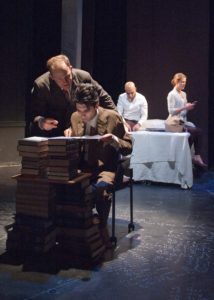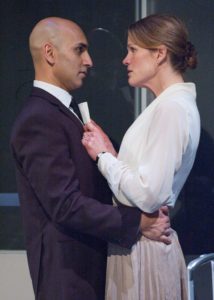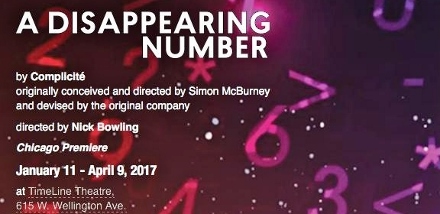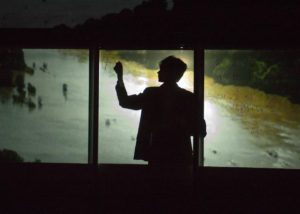THE PURITY OF INFINITY
 Mathematics can be maddening. Unless reflected in music (as in Bach), the “numbers game” feels stuck in a seemingly sterile realm of abstract entities, perfect in their predictability and infinite in range and scope. Math seems inhuman’”if not, as in its wartime applications, anti-human. It takes a rare play, like Proof and The Curious Incident of the Dog in the Nighttime, to kindle in laymen the awe triggered by a rare equation that yields an unforeseen result.
Mathematics can be maddening. Unless reflected in music (as in Bach), the “numbers game” feels stuck in a seemingly sterile realm of abstract entities, perfect in their predictability and infinite in range and scope. Math seems inhuman’”if not, as in its wartime applications, anti-human. It takes a rare play, like Proof and The Curious Incident of the Dog in the Nighttime, to kindle in laymen the awe triggered by a rare equation that yields an unforeseen result.
A 2007 company creation by British theater outfit Complicite, A Disappearing Number is another bridge builder: The one-act amounts to 110 minutes of intellectual inebriation. This perfectly constructed and appropriately balanced work, now in a suitably captivating staging by Nick Bowling, spins parallel plots of scientific inquiry caught up in human complications. A Chicago premiere from TimeLine Theatre Company, it’s a daunting reclamation of a nearly forgotten Indian math wizard and the English researcher who, pursuing this past, gets trapped in the kind of truths time can’t tarnish.
 From the start the audience confronts the case for math over life: The former indulges a seemingly inexhaustible curiosity for faceless facts’”hidden sequences, unity theories, ghostly patterns, prime numbers, “partitions” that disrupt logic as they pursue infinite series, and formulae that exist for and by themselves. These can be enthrallingly arcane. Even if you can’t grasp the details or the destinations, it’s easy to be smitten with its sheer symmetry and escapist disinterestedness. Here’s a discipline that, unlike art or politics, seems set outside of time and history.
From the start the audience confronts the case for math over life: The former indulges a seemingly inexhaustible curiosity for faceless facts’”hidden sequences, unity theories, ghostly patterns, prime numbers, “partitions” that disrupt logic as they pursue infinite series, and formulae that exist for and by themselves. These can be enthrallingly arcane. Even if you can’t grasp the details or the destinations, it’s easy to be smitten with its sheer symmetry and escapist disinterestedness. Here’s a discipline that, unlike art or politics, seems set outside of time and history.
Much like the twin tales that conjoin in Tom Stoppard’s Arcadia, the dovetailing vignettes of this puzzle play center around two relationships in the past and present. The more current narrative connects Ruth (Juliet Hart), a 43-year-old British math professor, and Al Cooper (Kareem Bandealy), the hedge fund and futures entrepreneur who comes to love and lose her. Ruth is in quest of the legacy of Srinivasa Ramanujan (Siddhartha Rajan), a mathematical genius from rural India. The second collaboration, told in simultaneous flashbacks, connects this young prodigy with famed Cambridge mathematician G. H. Hardy (Dennis William Grimes) whose life and career were forever altered in 1913 by a letter from this 26-year-old Brahmin thinker.
In it a self-taught “natural discoverer” expounded amazing theorems: You could say they were ahead of their time, but math hardly seems in time as it is. In any case, we watch these two blooming partnerships’”a century ago and today’”cause complex consequences that are inevitably mired in mortality.
 Complicite employs seemingly small juxtapositions and revelations: Al accidentally locked up all night in a lecture room with only his hand-held devices for help; the resemblance of sacred Hindu strings with the string theory that Ramanujan was to pioneer’”the plotting of graphs on a whiteboard; the origin of zero; a homesick Ramanujan desperate to find the right strict vegetarian diet or attempting suicide in the London underground; and Hardy desperate to help his colleague fight off the tuberculosis that will kill him at only 32’”to contrast the messy and conditional human world with the perfection of myriad infinities that mathematics pursues. Only occasionally (perhaps too much so) do life and science intersect as in Hardy’s too-brief concern during World War I that mathematics can harm as much as enlighten. (He cites the total number of dead’”34,954,920’”as if that much suffering can be reduced to “a disappearing number.”)
Complicite employs seemingly small juxtapositions and revelations: Al accidentally locked up all night in a lecture room with only his hand-held devices for help; the resemblance of sacred Hindu strings with the string theory that Ramanujan was to pioneer’”the plotting of graphs on a whiteboard; the origin of zero; a homesick Ramanujan desperate to find the right strict vegetarian diet or attempting suicide in the London underground; and Hardy desperate to help his colleague fight off the tuberculosis that will kill him at only 32’”to contrast the messy and conditional human world with the perfection of myriad infinities that mathematics pursues. Only occasionally (perhaps too much so) do life and science intersect as in Hardy’s too-brief concern during World War I that mathematics can harm as much as enlighten. (He cites the total number of dead’”34,954,920’”as if that much suffering can be reduced to “a disappearing number.”)
TimeLine amplifies the storylines’ weights and counterweights with a live music score by Ronnie Malley, Bob Garrett and Mikhail Fiksel and dazzling projections by Rasean Davonte Johnson. Rajan’s driven Ramanujan and Grimes’s discerning and paternal Hardy are well balanced by Hart’s dogged researcher and Bandealy’s leveling businessman. Buttressed by six skilled supporting players, their parallel paths never seem forced.
A Disappearing Number may not set you on fire to forge your own deathless equations. There is no great dramatic playoff at drama’s end. Much here seems more movement than message. But it goes one better: It conveys the wonder of having dug an immutable truth from not so random numbers. Few souls get to snatch infinity from transience.
A Disappearing Number
TimeLine Theatre, 615 W. Wellington Ave.
Wed & Thurs at 7:30; Fri at 8;
Sat at 4 & 8; Sun at 2
(check for additional performances)
ends on April 9, 2017
for tickets, call 773.281.8463 or visit Timeline
for more shows, visit Theatre in Chicago





